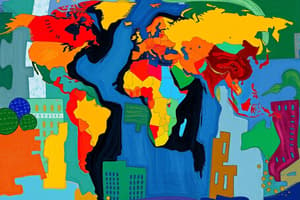Podcast
Questions and Answers
What is one primary purpose of protectionism in Canada?
What is one primary purpose of protectionism in Canada?
- To eliminate all forms of taxation on imports
- To reduce the cost of imports for consumers
- To protect domestic industries and consumers from global competition (correct)
- To encourage foreign investment in Canadian industries
What are tariffs commonly referred to as?
What are tariffs commonly referred to as?
- Customs duties (correct)
- Trade barriers
- Import quotas
- Subsidies
How do tariffs benefit Canadian businesses?
How do tariffs benefit Canadian businesses?
- They lower production costs for Canadian manufacturers
- They make imported goods more expensive, favoring local options (correct)
- They eliminate competition from foreign markets
- They provide direct financial support to exporters
What role does Finance Canada play concerning tariffs?
What role does Finance Canada play concerning tariffs?
What is a potential negative consequence of protectionism for consumers?
What is a potential negative consequence of protectionism for consumers?
What defines an international transaction?
What defines an international transaction?
Which of the following is NOT considered a benefit of international business?
Which of the following is NOT considered a benefit of international business?
What is a characteristic of a global product?
What is a characteristic of a global product?
What is offshore outsourcing primarily concerned with?
What is offshore outsourcing primarily concerned with?
Which factor is NOT part of the Five Ps of Production?
Which factor is NOT part of the Five Ps of Production?
Which is a significant concern regarding offshore outsourcing?
Which is a significant concern regarding offshore outsourcing?
What does environmental degradation refer to?
What does environmental degradation refer to?
How do consumer action groups help toward labor issues?
How do consumer action groups help toward labor issues?
Which of the following examples illustrates a domestic transaction?
Which of the following examples illustrates a domestic transaction?
What must a company understand before selling internationally?
What must a company understand before selling internationally?
Flashcards
Protectionism
Protectionism
Government policies that protect domestic industries and consumers by creating barriers to imports.
Tariffs
Tariffs
Taxes on imported goods, making them more expensive.
Customs Duties
Customs Duties
Another name for tariffs.
Import Barriers
Import Barriers
Signup and view all the flashcards
Domestic Businesses
Domestic Businesses
Signup and view all the flashcards
Global Economy
Global Economy
Signup and view all the flashcards
International Business
International Business
Signup and view all the flashcards
Domestic Transaction
Domestic Transaction
Signup and view all the flashcards
International Trade
International Trade
Signup and view all the flashcards
Global Product
Global Product
Signup and view all the flashcards
Offshore Outsourcing
Offshore Outsourcing
Signup and view all the flashcards
Social Costs
Social Costs
Signup and view all the flashcards
Child Labor
Child Labor
Signup and view all the flashcards
Environmental Degradation
Environmental Degradation
Signup and view all the flashcards
Sustainable Development
Sustainable Development
Signup and view all the flashcards
The Five Ps of Production
The Five Ps of Production
Signup and view all the flashcards
Study Notes
International Business
- International business involves creating, shipping, and selling goods and services across national borders.
- This is often called international trade or foreign trade.
- Participation contributes to the global economy.
- Domestic transactions involve buying products made in the same country.
- International transactions involve buying items from other countries, even if purchased at a local store.
Benefits of International Business
- Access to markets: Understanding consumer needs and wants is essential before selling internationally.
- Standardized products (global products) are offered the same way in all countries. (e.g., packaged food is NOT a global product)
- Cheaper labor costs in other countries.
- Improved product quality by utilizing resources globally (e.g., car manufacturing).
- Increased potential for sales and increased production, as international markets grow.
The Five Ps of Production
- Product: The good or service offered.
- Price: The cost of the product, which can vary by country.
- Promotion: Technology allows easy global promotion.
- Proximity: Distance from the purchase location/production location.
- Preference: Some countries specialize in quality goods.
The Cost of International Business and Tariffs
Costs of International Trade
- International business has hidden costs (social costs).
- Social costs include offshoring, outsourcing, human rights abuses, labor abuses, and environmental degradation.
Offshore Outsourcing
- Offshoring outsourcing involves hiring providers in countries with lower labor costs.
- This often moves jobs from a company's internal production to an external business specializing in the operation.
Human Rights Issues and Labor Abuses
- Human rights issues and labor abuses are ethical concerns with offshoring.
- Poorer countries sometimes experience widespread workplace abuses.
- Child labor is a significant concern.
- Child labor is defined as employment under age 16.
- The International Labour Organization (ILO) promotes social justice and worker rights.
- Consumer action groups aim to improve conditions.
Environmental Degradation
- Sustainable development aims to meet present needs without harming future generations.
- Environmental degradation occurs when nature consumes resources faster than they regenerate.
Protectionism
- Governments (e.g., Canada) use barriers to protect domestic businesses and consumers.
- Barriers protect local industries facing global competition.
- Barriers protect against imports not meeting Canadian regulations.
Tariffs
- Tariffs (customs duties) are taxes on imported goods.
- Finance Canada develops tariff policies.
- Tariffs make imported goods more expensive, boosting Canadian businesses.
- Tariffs make Canadian goods more affordable for consumers.
Studying That Suits You
Use AI to generate personalized quizzes and flashcards to suit your learning preferences.




